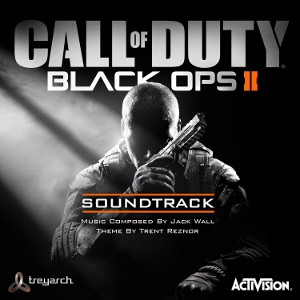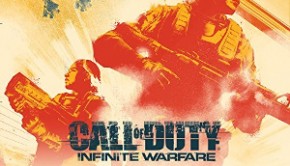Call of Duty -Black Ops II- Soundtrack
 |
Album Title: Call of Duty -Black Ops II- Soundtrack |
| Record Label: Activision |
|
| Catalog No.: N/A |
|
| Release Date: February 5, 2013 |
|
| Purchase: Download at iTunes |
Overview
For pretty much any other video game franchise, such huge numbers would be close to unbelievable, but for the Call of Duty series, it almost seemed like business as usual. The franchise’s most recent instalment Call of Duty: Black Ops II became the biggest entertainment launch of all time, raking in $500 million on its first day – a record previously held by Call of Duty: Modern Warfare 3, and before that by Call of Duty: Black Ops and Call of Duty: Modern Warfare 2. In the end, Black Ops II‘s sales didn’t set a new record for the franchise, but 22 million sold copies (as of May 2013) aren’t really a reason for publisher Activision to feel sad and rejected either. Apart from this stunning commercial success, yet more familiar sights awaited within the game itself. While Black Ops II introduced some new elements like nonlinear gameplay and a storyline that moved back and forth between recent past (1980s) and near future (2025), all in all it was the same Call of Duty experience that millions of gamers had obviously come to love.
Musically, the Call of Duty series has always been one of constant change, with each composer putting their stamp on the title(s) they were asked to work on – with varying degrees of success. From a roster that includes Michael Giacchino, Graeme Revell, Joel Goldsmith, Lorne Balfe and Brian Tyler, it’s arguably Sean Murray’s modernistic and refreshing soundtracks for World at War (sadly still unreleased on album) and Black Ops that are the franchise’s shining musical moments. After Sean Murray was the only composer to write music for two Call of Duty games, it was a bit of a surprise that he wouldn’t return for Black Ops‘ sequel. Instead, developer Treyarch drafted veteran game composer Jack Wall, based on the strength of his work on 2010’s Mass Effect 2.
In tune with the franchise’s varied musical history, Wall was given the freedom to move away from the sounds explored by previous Call of Duty games. In interviews, Wall explained that he studied the score for Black Ops II‘s predecessors and identified elements he planned to keep – such as the guitar work on Black Ops, and that score’s sense of sombre starkness. However, he also identified those areas in which he wanted to introduce changes: a greater focus on melodies and thematic work. As Wall put it: “Rather than the ‘balls-to-the-wall’ approach that you hear in most shooters, it was time to get back to something more emotional.” To achieve this aim of a more pensive and emotive soundtrack, Wall began his work by writing Black Ops II‘s major themes, and then moving on to the different levels. Here, the main challenge was to underscore both the game’s numerous locations, and its two different temporal settings in the 1980s and 2025. To communicate these jumps in time, Wall went with a predominantly acoustic and orchestral score for the past timeline, and an electronic hybrid sound for 2025, which depending on the location would feel either ‘dirty’ or ‘clean’ – “electronic bleak” àla Blade Runner, as Wall put it. Another aspect that Wall introduced was an increased focus on solo instruments and voices, to put into music what he identified as the game’s underlying narrative thread: “A few take on the world.”
While pre-release expectations for Black Ops II were already high due to Wall’s stature and the franchise’s popularity, the score received the majority of its press coverage for the theme which Academy Award-winning songwriter Trent Reznor of Nine Inch Nails fame was drafted to write. However, Reznor and Wall didn’t collaborate at any stage – although several years ago, Wall had worked as a second engineer on Nine Inch Nails’ first album. Another feature that set Black Ops II apart from other Western game scores was its length – almost 150 minutes of music. According to Wall, this immense running time was the result of two things: firstly, fan reaction following Mass Effect 2, demanding a full score release, and secondly the fact that with the planned digital release of Black Ops II‘s soundtrack, there were no limitations to the amount of music that could be included on the album. Finally, Black Ops II‘s very generous score release was made available in November 2012 to coincide with the release of the game.
Body
Where to start with an album release as humongous as Black Ops II, one which covers an immense stylistic terrain? Maybe at the beginning. After Modern Warfare 3‘s by-the-numbers approach to action music writing, there was no doubt a good number of score fans that were wondering whether Black Ops II would go down the same path. Thankfully, that’s (mostly) not the case – Black Ops II‘s features a great deal of strong and rousing action cues. Make no mistake, these pieces are still very much rooted in contemporary Western blockbuster scoring conventions. Throbbing rhythms by the lower strings and percussion instruments are combined with violin ostinati and short, simple brass phrases that try their best to sound heroic and memorable. However, despite the proliferation of game scores that lazily rely on this formula, there’s a way to make this approach work, and Wall does so in stirring fashion during large parts of Black Ops II. “Savimbi’s Pride” kicks off things with a bang, its catchy brass phrases powered by a more intelligent combination of underlying rhythm lines than usually. This turns turns the cue into a pulsating powerhouse that benefits greatly from the inclusion of African drums, as well as the obvious advantage of being recorded at Abbey Road Studios. While the melodic bits on “Savimbi’s Pride” aren’t hugely original, they’re efficient in their aspiring nature, and Wall throws in some nice details like the performance of the cue’s recurring motif in a duet for horns and trumpets around 2:30. “Catch Me If You Can” keeps up the tension, its melodic elements simpler than those on “Savimbi’s Pride”, but again there’s sufficient depth of ensemble and frantic rhythmic counterpoint to make the melodies’ bold reach tangible.
Black Ops II‘s first half continues this mix of relatively detailed, rhythm-centric orchestrations, brass leads and world music elements, which not only ensures the high quality of much of Black Ops II‘s action material, but also helps to tie the score together. While the game’s narrative soon moves to Afghanistan with “Desert Ride” and “Sand and Camels”, the album flow remains coherent due to the fact that the rhythmic drive pushing these tracks forward is the same as on previous and later pieces. On top of these rhythms, Wall mixes in some faux-Middle Eastern influences, which now also permeate the melodic material – still short phrases, but now also given to the violins every once in a while, and using the harmonic minor scale to trigger memories of Lawrence of Arabia and the like. Rather than diluting the music’s trajectory, the change of locale manages to add colour. Wall succeeds in introducing still more variety within Black Ops II‘s action material throughout the album’s first half: “Afghanistan 2025” jumps forward in time not so much via the use of synths, but rather through more streamlined, Remote Control-inspired orchestrations that are still sufficiently detailed to turn the cue into one of Black Ops II‘s most powerful tracks. “Future Wars”, on the other hand, is more synth driven and its relatively simple beats don’t do the music much favour during the cue’s first three minutes, but things pick up once acoustic layers are added to the electronic rhythms and the piece turns more complex. “The Search for Josefina” and “Rivers and Rain” move into the opposite direction, presenting Black Ops II‘s action sounds in a more restrained manner that is still evocative. Particularly “The Search for Josefina” is worthy of mention, since Wall – as he’s done frequently throughout his career – seamlessly brings together different musical influences. Fervent hand percussion rhythms, female solo vocals, an ethnic guitar-like instrument, and electronic guitars combine into a more acoustic version of Black Ops II‘s adrenaline-driven music that is as rousing as the full ensemble pieces. “Pakistan Run” is the score’s most heady mixture of sounds, as Azam Ali’s intoxicating vocals float over Middle-Eastern percussion and electronic beats, creating an ear-catching contrast that stretches the song’s cohesiveness, but never breaks it.
But what happened to Wall’s intention to make Black Ops II more melody-centric and intimate? To a large degree, his melodic ambitions are realised on these action tracks through their catchy melodic lead phrases, which make Black Ops II a more accessible – if not more creative – work than the modernistic, harsh strains of Black Ops. Outside of these battle cues, noteworthy melodic statements are actually a bit rare, to a degree because Wall’s preferred use of short melodic bits doesn’t translate particularly well to slower-paced compositions. “Judgement Day”, coming after all the fighting as subsided, recognises its limitations and doesn’t overstay its welcome, but its purely string-based orchestrations radiate a fitting sense of warmth and piece. “Hero’s Theme”, on the other hand, sees Wall trying to write longer-winded melodies, and while the result hits all the expected emotional notes – nobility, duty, resilience – these sentiments aren’t presented with much depth, which makes for a harmonically pleasing, but also hackneyed cue. “DeFalco’s Theme” avoids this issue through its focus on texture rather than melody, evoking a warped, somewhat surreal synth atmosphere that adds another appealing facet to Black Ops II‘s palette, as the cue skilfully underscores one of the game’s more colourful characters.
The one melody that listeners will take away from Black Ops II actually isn’t a creation of Wall himself. Instead, it’s the Nicaraguan lullaby that is the basis of both “Niño Precioso” and “Raul Menendez Theme (“Niño Precioso” – Orchestral)”, the theme for the game’s antagonist. Its use inspired by a scene that showed Menendez’ dedication for his beloved sister, the lullaby’s soothing melody is instantly memorable and Wall puts it to great use: first as a compassionate duet between acoustic guitar and Spanish male vocals, and later as a full-blown orchestral string ballad with mariachi trumpet, tastefully wringing every bit of sentimentality out of the piece. Both tracks are undoubtedly album highlights and Wall’s idea to give Black Ops II‘s bad guy the by far the most charismatic theme is quite striking. Still though, the compositions’ unabashed and sincere melodicism leaves these cues without much connection to the rest of the album – one of the few occasions on which the soundtrack’s material doesn’t gel successfully. Finally, it’s worth noting that none of these themes have much impact on the soundtrack as a whole, as they don’t appear in recognisable form outside of the cues that introduce them. Thematic coherence is instead created on a smaller scale through the use of recurring melodic leads in the action cues, for example on the Afghanistan tracks. All in all, given its two and a half hour run time, Black Ops II could have done with more thematic consistency.
What’s more prevalent on Black Ops II than gushing melodies are introspective moments that balance the ‘balls-to-the-wall’ sound that Wall referred to. Indeed, Black Ops II‘s first half balances battle cues with moody stealth pieces that mainly characterise the game’s future timeline. While these compositions are short on adrenaline and melodies, Wall again displays his genre-crossing composition skills. “Hidden” is the first such low-key track, opening with a deep cello melody surrounded by eerie synths and a rising and falling, electronically manipulated string line that only intensifies the track’s unsettling atmosphere, reaching back in mood to Black Ops‘noisier parts. This disquieting atmosphere is successfully rekindled in the second half of “Suicide Ride / Kravchenko Interrogation / Anvil Again”, whose mounting dissonances and darkly brooding contemplation segue into a reprise of Black Ops‘s “Anvil” – the score’s only direct quote of its predecessor’s material. On “Hidden” and “Flying Squirrels”, rough electric guitar riffs create the ‘dirty’ feel Wall referred to in interviews, while the instrument finds its place amid the synthesised surroundings with ease. “Flying Squirrel” is also the first track to exhibit the aforementioned Blade Runner influences, and later tracks like “Searchlights” and “Anthem” highlight why it was a smart idea to follow that classic soundtrack’s stylistic blueprint. Both on Blade Runner and on Black Ops II, soothing synth melancholy is mixed with contributions by vocal soloists and ethnic instruments, creating a sound that is both futuristic and exotic – and in the case of Black Ops II, this mix allows the 2025 compositions to tie in with the world music tinged 1980s tracks to subtly increase coherency across the album.
Throughout most of the first half of Black Ops II then, Wall creates an impressively coherent and substantial soundtrack. Sure, there are a couple of compositions that could have easily been left off – “Alex and David” and “You Can’t Kill Me” veer too often and too quickly between different musical genres to come together as satisfying compositions, the more clubby beats of “Anthem (Tuey Remix)” and “Shadows (Outer Club Solar)” feel at odds with the rest of the album, and “Spider Bot”’s industrially-tinged underscore doesn’t develop much in any direction. By and large though, Black Ops II starts on a very strong foot and seems to validate Wall’s decision to include all music from the game. However, that generosity comes under scrutiny on the more uneven second half of Black Ops II, its start marked by – of all things – the first movement of Mozart’s 40th Symphony in a rather plodding performance that lacks excitement. More pertinent though than the lacklustre performance is the question why Mozart’s Allegro molto was included in the first place, given that musically, it has nothing to do with the rest of the soundtrack.
Black Ops II‘s second discontinues this impression of disintegrating consistency, although it certainly doesn’t entirely lose its appeal. In fact, there’s a number of engaging action tracks that can’t quite compete with of their counterparts on the first disc and lack their colourful complexion (apart from the Middle-Eastern influences on “Farid”), but they still make for entertaining listen. “Dockside” heralds the upcoming move to an increasing integration of synth sounds, with the game’s narrative now squarely situated in the near future of 2025. On “Dockside”, Wall applies the relatively dense layering of elements not so much to the rhythms, but rather to a large array of sound effects, which effectively transports the battle music into a more futuristic environment. Pumping electronic beats and grinding electric guitars make “Mason Enters / Yemenite Fight” the album’s grittiest track, particularly when the guitar goes into overdrive in the cue’s second half and leads the piece to a punishing climax. “War Machine” shows that the inclusion of synth elements and industrial rhythms doesn’t mean that an action cue has to sound dumbed down. Instead, more instruments can also simply mean more layers for the composer to play around with and to pile up in counterpoint, which is exactly what Wall does here, while of course not forgetting the motivational brass leads.
However, often enough Black Ops II‘s second half also transports its action material into the future by simplifying the percussion segments, making the rhythmic progressions more predictable – and ending up with the ‘simple string ostinati and synth rhythms + short brass motifs’ formula that so many lesser Remote Control-inspired game scores follow. Arguably, “Afghanistan 2025” predicted this development, but avoided taking it too far – an inhabitation that is now often gone. “Chasing a Ghost” highlights the resulting difference in quality very well, with the cue’s first half lacking the density, counterpoint and thus urgency of earlier action tracks – fortunately all traits that return later in the piece. “On Deck” at least benefits from the surprisingly edgy and chromatic nature of its underlying violin ostinato, but other battle cues are not so lucky, which has the most unwelcome effect of deflating the drama that Black Ops II has built up so far, just as the album’s finale draws nearer. Among the album’s last stretch of action tracks, “Sniper on the 110” is the only one that is thoroughly convincing. Elsewhere, as on “Streetcar Named Fire”, Wall seems to try and compensate for the generic nature of the brass and string overlays with quirkier and more abrasive synth additions, which makes the music more interesting, but not necessarily more impacting. “Escort” and “Dogfight” try to mix clubby synth beats with the score’s trademark rising brass lines, but the result feels too much like gritty partying to fill in as the epic finale of a two-and-a-half hour score. It’s one of the few occasions where Wall’s genre mix doesn’t work successfully, and that occasion comes at a very inopportune time. The final action track “Adrenaline” increases the electronic influence further and throws dubstep elements and harsh sound effects into the mix. The cue is most effective when it portrays the chaos of battle and summons up some much needed intensity, but ultimately the piece can’t decide whether it wants to be anthemic or just go helter-skelter with its noisier components.
The non-action tracks on Black Ops II‘s second half are a more significant step down from their counterparts on the first half than is the case with the battle cues. Again, there’s a number of shorter compositions that drift back and forth between too many disparate moods to work successfully as standalone pieces, including “Go Home Gringos”, “Nexus Target” and “Panic Attack / P.T.S.D.” It’s a shame, because these tracks incorporate acoustic guitar passages to underscore the antagonist’s Middle-American providence, but the instrument’s characteristic timbres are lost in the often aimless shifts between brooding underscore and brief outbursts of action material. “The Invasion of Panama” inserts the acoustic guitar as a solo instruments into a battle cue, but the already increasingly standard rhythms and layers make the music less entertaining than it could be. “Cordis Die” should be a big moment on the soundtrack – after all, it underscores the antagonist’s populist movement, more than a billion supporters strong. Difficult to take seriously as part of the game’s narrative, Cordis Die’s musical signature doesn’t help much – moody synth underscore with a constant pulse segues into standard RC applications of swelling brass chords over a militaristic violin line. It ends with a massive, distorted synth pad that is the track’s most creative idea and hints at the chaos to come, but it ultimately fails to deliver the punch.
Oh, and Trent Reznor’s theme? Well, it’s nothing terribly special. “Theme from Call of Duty Black Ops II” moves back and forth between brooding passages for downcast synth chords, and those moments when a fuzzy carpet of guitar riffs and stomping rock percussion open up the piece and try to make it soar with the help of Reznor’s theme. The melody itself is a lingering, rising piano line that owes a lot to Clint Mansell’s brand of melodic minimalism. Like the whole track, the theme is an adequate, but clichéd creation that doesn’t feel like a sign of much creative energy. The same goes for Wall’s reworking of the theme on “Theme from Call of Duty Black Ops II (Orchestral Mix)”, which sounds almost identical to the original version, apart from some brass inserts. Both tracks also suffer from a strangely muffled, boxy sound that robs particularly the guitars on “Theme from Call of Duty Black Ops II” of some of their impact.
Summary
It’s not quite the event that its commercial pedigree, creative reputation and sheer running time might suggest, but Black Ops II still takes its place as one of the Call of Duty franchise’s better scores. The greatest strength of Jack Wall’s creation is its ability to wrestle its multitude of elements – orchestra, electronica, world music, various soloists – into a melange that throughout most of Black Ops II‘s running time remains not only coherent, but also fun. The majority of Black Ops II‘s action tracks are a definite cut above the Call of Duty series’ previous attempts to dabble in Western blockbuster scoring conventions, mixing catchy brass leads with sufficiently dense and exciting percussion layers. While Wall’s ambition to write a more melodic and thematic score is only realised in parts, this caveat is made up Black Ops II‘s atmospherically potent mood pieces which balance the battle cues on the album’s first half with appealing concoctions of timbres and instrumental colours. More accessible than its predecessor while maintaining some of Black Ops‘ edge, Black Ops II‘s is a less strikingly creative work, but often still an impressive manifestation of Wall’s wealth of musical ideas.
The ride gets bumpier on Black Ops II‘s latter half though, with the quality of the action material decreasing particularly towards the end of the soundtrack, while the more atmospheric pieces now fail to make the same impact as their predecessors. These issues ultimately turn Black Ops II‘s finale into an underwhelming affair that is less dramatic than the album’s beginnings. A more considered selection of music to include on the soundtrack might have helped, but then again, how do you leave out most of the music written for the game’s last stages? Taken as a whole though, Black Ops II is still a multi-faceted work which in its best moments displays what a great modern action score can sound like.
Do you agree with the review and score? Let us know in the comments below!
4
Posted on April 11, 2014 by Simon Elchlepp. Last modified on April 11, 2014.













